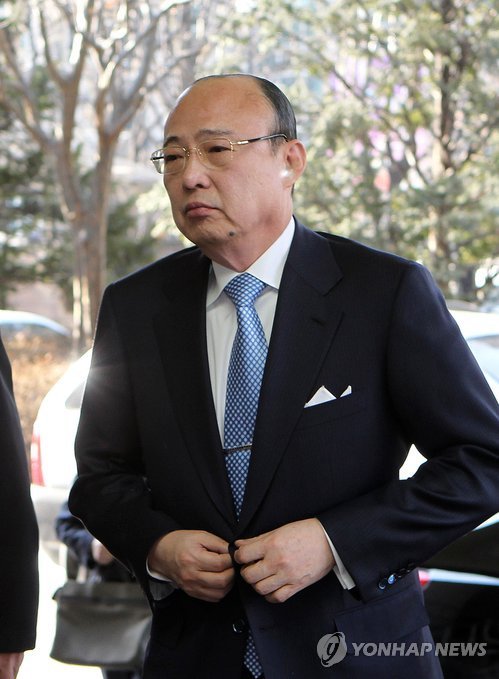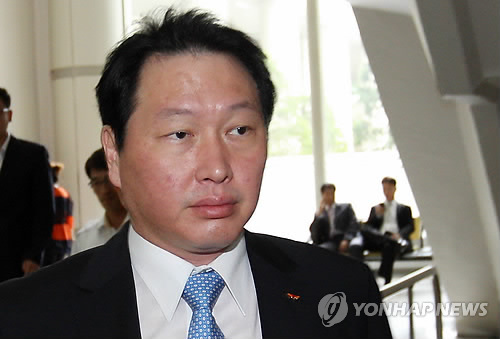[SUPER RICH] Business tycoons shun payroll disclosure
By Korea HeraldPublished : Sept. 1, 2015 - 17:55
More and more high-level “registered” executives at business conglomerates are resigning from their official positions at corporate affiliates, apparently fearing a public backlash following the disclosure of their salaries.
Registered executives have the legal power to participate in the overall management of the companies while unregistered executives have less power in the boardroom.
According to Chaebul.com, a website devoted to tracing the wealth of the superrich, among the country’s top 30 conglomerates, 78 affiliates listed their chairman as a registered executive in July, about 27.8 percent fall from 108 in December 2013.
Nine of the most representative chaebol families, including those in charge of Samsung, SK, Hyundai Heavy Industries, Hanwha, Doosan, Shinsegae, LS, Daelim and Mirae Asset do not have any registered executives at their affiliates.


Notable business tycoons who have removed themselves as registered executives include Young Poong Group chairman Jhang Hyung-jin, who stepped down from six affiliates’ registered executive list and Lotte general chairman Shin Kyuk-ho, who resigned from five. CJ chairman Lee Jae-hyun, who was convicted of embezzlement, resigned from five, while Hyundai Motor Group chairman Chung Mong-koo, Hyundai Group chairwoman Hyun Jeong-eun, Hyundai Department Store chairman Chung Ji-sun and Dongkuk Steel Mill chairman Chang Sae-joo pulled out of one affiliate, each.
The number of registered executives among the kin of chaebol chiefs -- parents, children or grandchildren as well as cousins – also fell during the same period, from 275 to 204.
The apparent reason for the moves is a legal revision mandating payroll disclosure of all registered executives at companies at which the CEO receives more than 500 million won a year. This is designed to ensure transparency in business operations.
After the revision came into effect in 2013, the issue caused a stir, with the public expressing fury over the size of the paychecks that top officials at conglomerates received compared to ordinary workers.
Some of the business leaders were revealed to have been paid their full salaries regardless of whether they were conducting their duties.
In 2014, Hanwha chairman Kim Seung-youn stepped down from seven affiliates including Hanwha Chemical and Hanwha E&C as a registered executive in February last year, marking the highest number of resignations. Chey, who was recently pardoned, also pulled his name from three affiliates including SK Innovation.
However, business insiders claim that the regulation has little impact on the real managerial world where the business tycoons, who have become unregistered executives, still have the dominant power in the decision-making processes.
For example, Samsung Electronics vice chairman Lee Jae-yong and Cheil Industries president Lee Seo-hyun as well as Mirae Asset Group chairman Park Hyun-ju have always stayed as unregistered executives of their companies but very few question their influence in the control tower.
Rep. Lee Jong-kul, the floor leader of the opposition New Politics Alliance for Democracy, said last month that the party will push to revise the law to expand the disclosure to unregistered executives including CEO, chief financial officers and others. “We are seeing some cases of business moguls who rake in big payrolls without serving their duties properly,” he said.
By Bae Ji-sook (baejisook@heraldcorp.com)
-
Articles by Korea Herald



![[Exclusive] Korean military set to ban iPhones over 'security' concerns](http://res.heraldm.com/phpwas/restmb_idxmake.php?idx=644&simg=/content/image/2024/04/23/20240423050599_0.jpg&u=20240423183955)




![[Herald Interview] 'Amid aging population, Korea to invite more young professionals from overseas'](http://res.heraldm.com/phpwas/restmb_idxmake.php?idx=644&simg=/content/image/2024/04/24/20240424050844_0.jpg&u=20240424200058)

![[Pressure points] Leggings in public: Fashion statement or social faux pas?](http://res.heraldm.com/phpwas/restmb_idxmake.php?idx=644&simg=/content/image/2024/04/23/20240423050669_0.jpg&u=)









